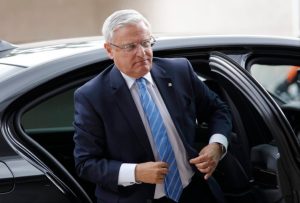The issue of the development of an adequate defense policy has been on the EU agenda for some time. This is not only the inevitable result of the Russian invasion of Ukraine, it also necessarily follows from the Trump threats relative to NATO not only during his Presidential term but also in the current US electoral campaign.
This week, EU Parliament President, Roberta Metsola, emphasized that the EU would need to spend more of its funds on defense after the latest Trump threats. Earlier, Manfred Weber, the Bavarian leader of the European People’s Party (EPP), had spoken at length on the need for Europe to increase its defense spending and on the EPP’s proposal that the EU should invest in nuclear deterrence. Do we need this? France already has 300 nuclear warheads!
The defense industry, including that within the European Union itself, is undoubtedly lobbying intensively. An EU defense budget running into several billion euros would definitely be in their interest! In 2023 the EU’s military spending reached a record €230 billion.
Some years back Corporate Europe Observatory (CEO) reported that the decision-making process for the EU Preparatory Action on Defense Research was heavily dominated by corporate interests. Corporate Europe Observatory (CEO) is a research and campaign group working to expose and challenge the privileged access and influence enjoyed by corporations and their lobby groups in EU policy making.
A leaked draft of the EPP EU Parliamentary elections electoral manifesto indicates the proposal for the creation of a standalone defense portfolio in the next EU Commission.
Two EU Member states, Sweden and Finland, faced with the realty of Russian aggression against its neighbor Ukraine have abandoned their neutrality and sought NATO membership. Finland has already joined. When Sweden eventually joins NATO, 24 EU member states out of 28 will be NATO members, the exceptions being Malta, Austria, Ireland and Cyprus. Cyprus has in the past sought NATO membership but its application has been blocked by Türkiye.
In this context what is the significance of Malta’s neutrality? This is an essential debate, long overdue, which should not be avoided, especially in view of the prevalent discourse in the EU at this point in time and particularly in view of developments on EU defense policy which are now inevitable.
Malta’s foreign policy has always been dependent on third countries guaranteeing its security. In the past it was an agreement with four countries, namely Italy, France, Libya and Algeria, which after the 1979 closure of the military base in Malta served this purpose. Nowadays this vacuum is filled by the provisions of the EU treaties as a result of which solidarity between EU member states signifies in practice that, in time of need, all the 28 states are there to help out each other. Even in matters of defense.
However, we know through experience that this does not necessarily work out. At the end of the day states do not have friends but interests which limit or enhance their actions or policy options. Within the European Union this is no different. The difficulties faced in addressing migration issues is a case in point: solidarity between EU member states has proven to be difficult to attain in practice notwithstanding the provisions of the EU treaties.
Security and defense issues are undoubtedly continuously on the diplomatic agenda. What results does not necessarily spill over in the public political debate.
Occasionally it is different: this happened in the recent past through discussions on the possibilities for a Status of Forces Agreement (SOFA) between Malta and the United States of America around four years ago.
Particularly since the closure of the British military base, multilateral engagement has always been Malta’s preferred defense policy option. It is hence in Malta’s interests that the European Union is in a position to adequately take care of its own defense. However, we need to participate actively in the EU defense debate, even if, as a direct consequence it may be necessary to re-visit and tweak our neutrality.
Protecting our interests signifies an active participation in the EU defense debate and applying the breaks, when necessary, to a rising militarism within the EU. At the end of the day, it is in our interest to speak up clearly.
published in the Malta Independent on Sunday : 18 February 2024


